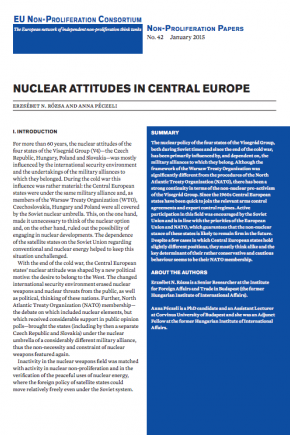Nuclear Attitudes in Central Europe
The nuclear policy of the four states of the Visegrád Group, both during Soviet times and since the end of the cold war, has been primarily influenced by, and dependent on, the military alliances to which they belong. Although the framework of the Warsaw Treaty Organization was significantly different from the procedures of the North Atlantic Treaty Organization (NATO), there has been a strong continuity in terms of the non-nuclear pro-activism of the Visegrád Group. Since the 1960s Central European states have been quick to join the relevant arms control agreements and export control regimes. Active participation in this field was encouraged by the Soviet Union and is in line with the priorities of the European Union and NATO, which guarantees that the non-nuclear stance of these states is likely to remain firm in the future. Despite a few cases in which Central European states hold slightly different positions, they mostly think alike and the key determinant of their rather conservative and cautious behaviour seems to be their NATO membership.

